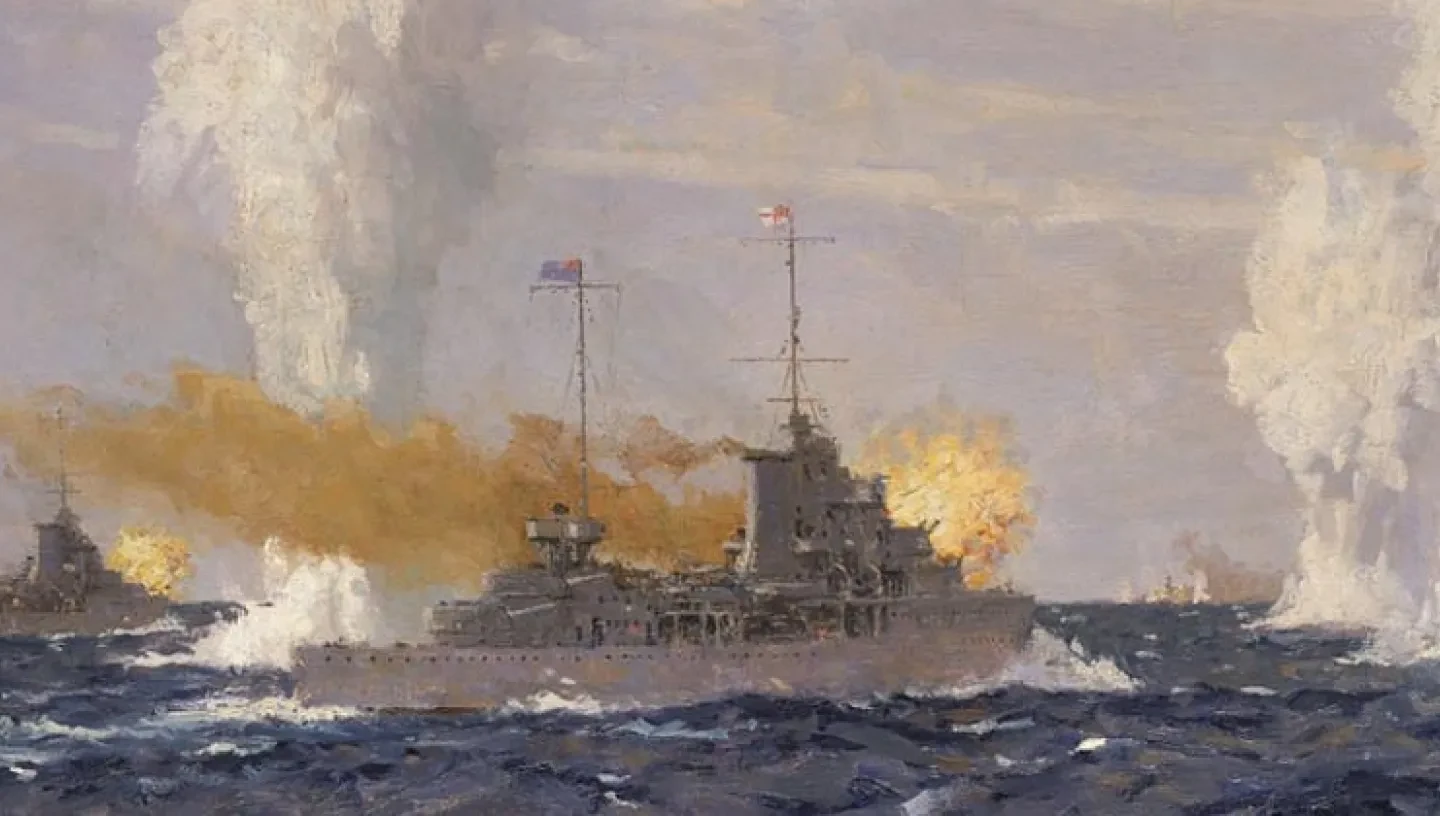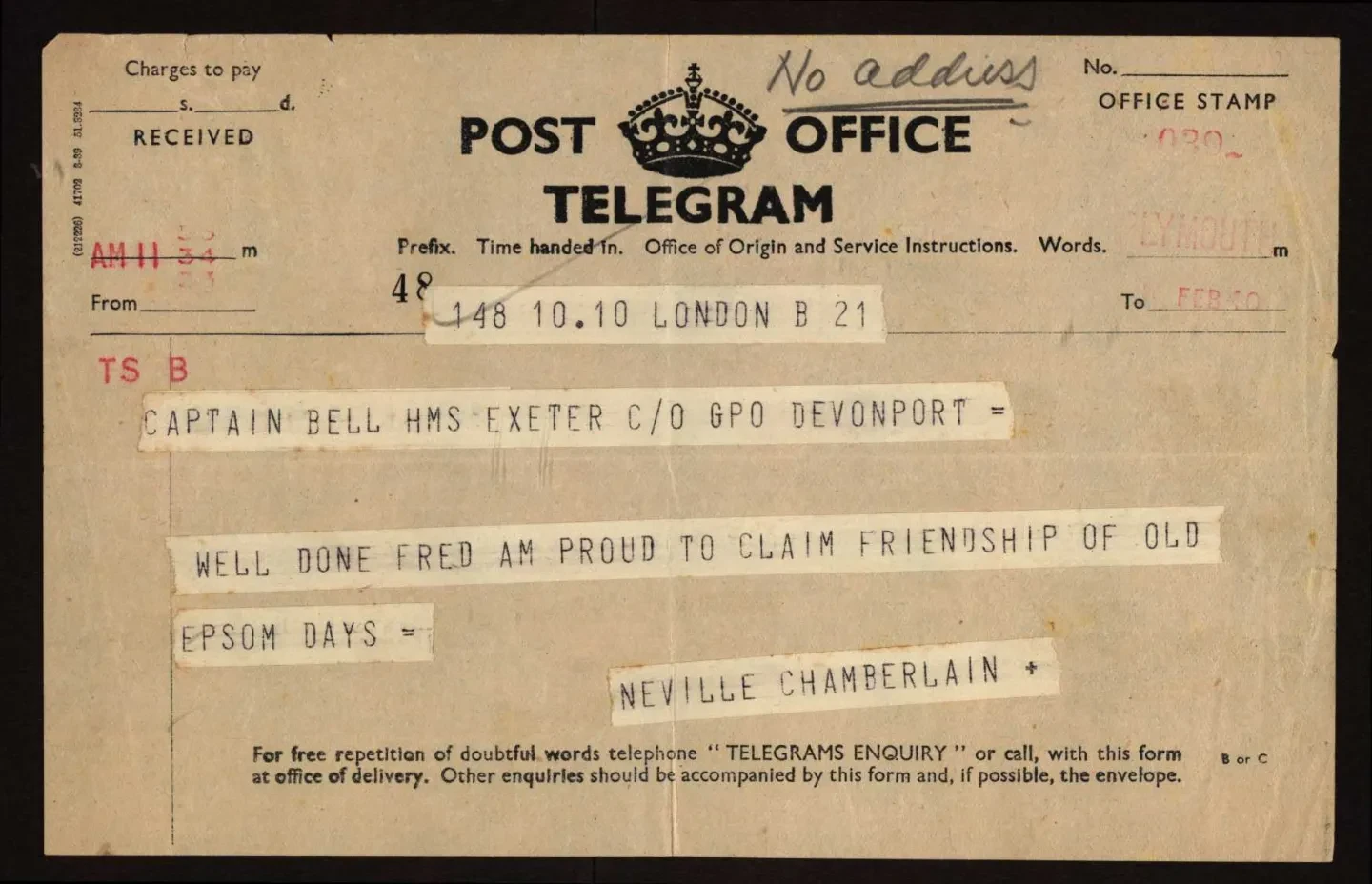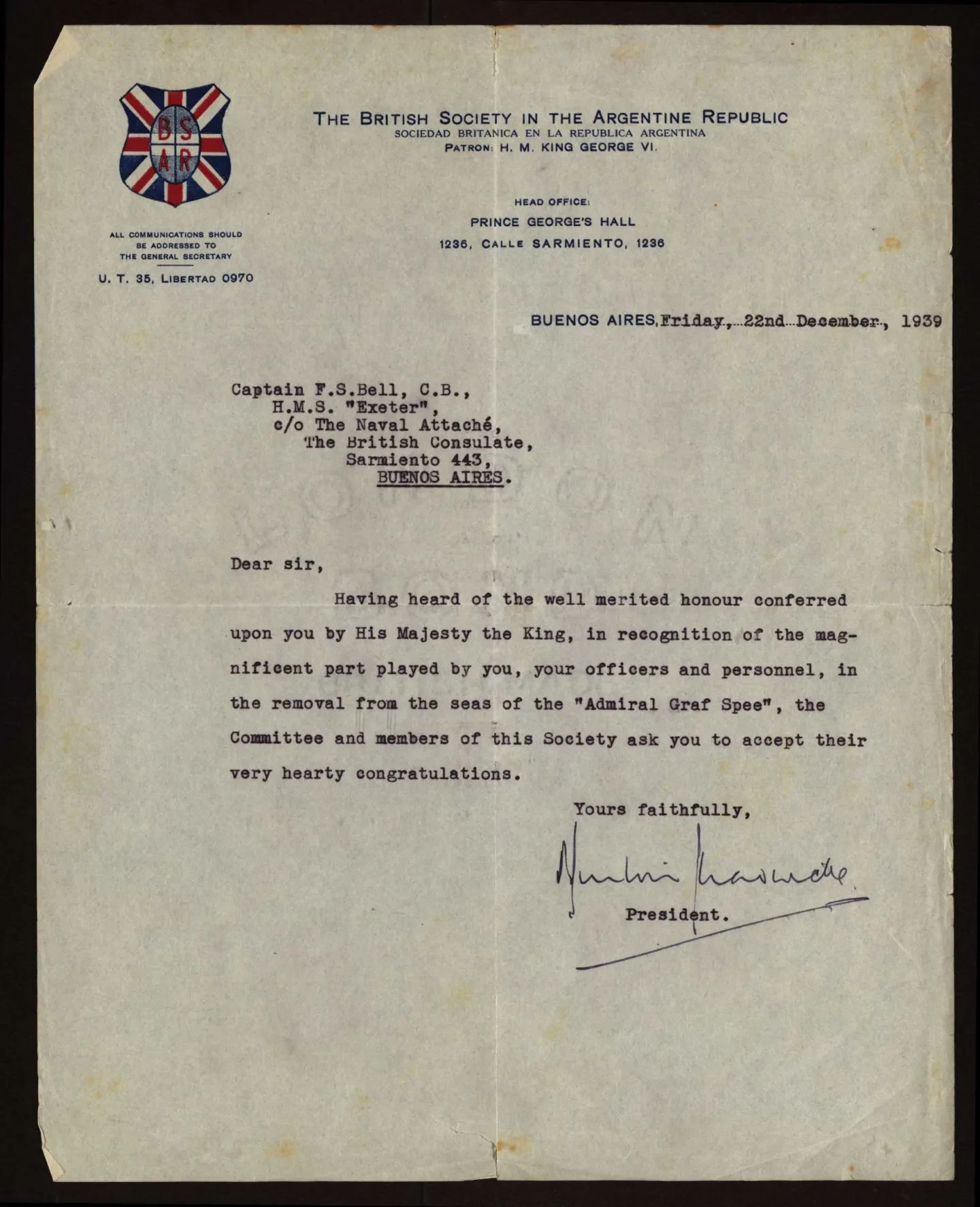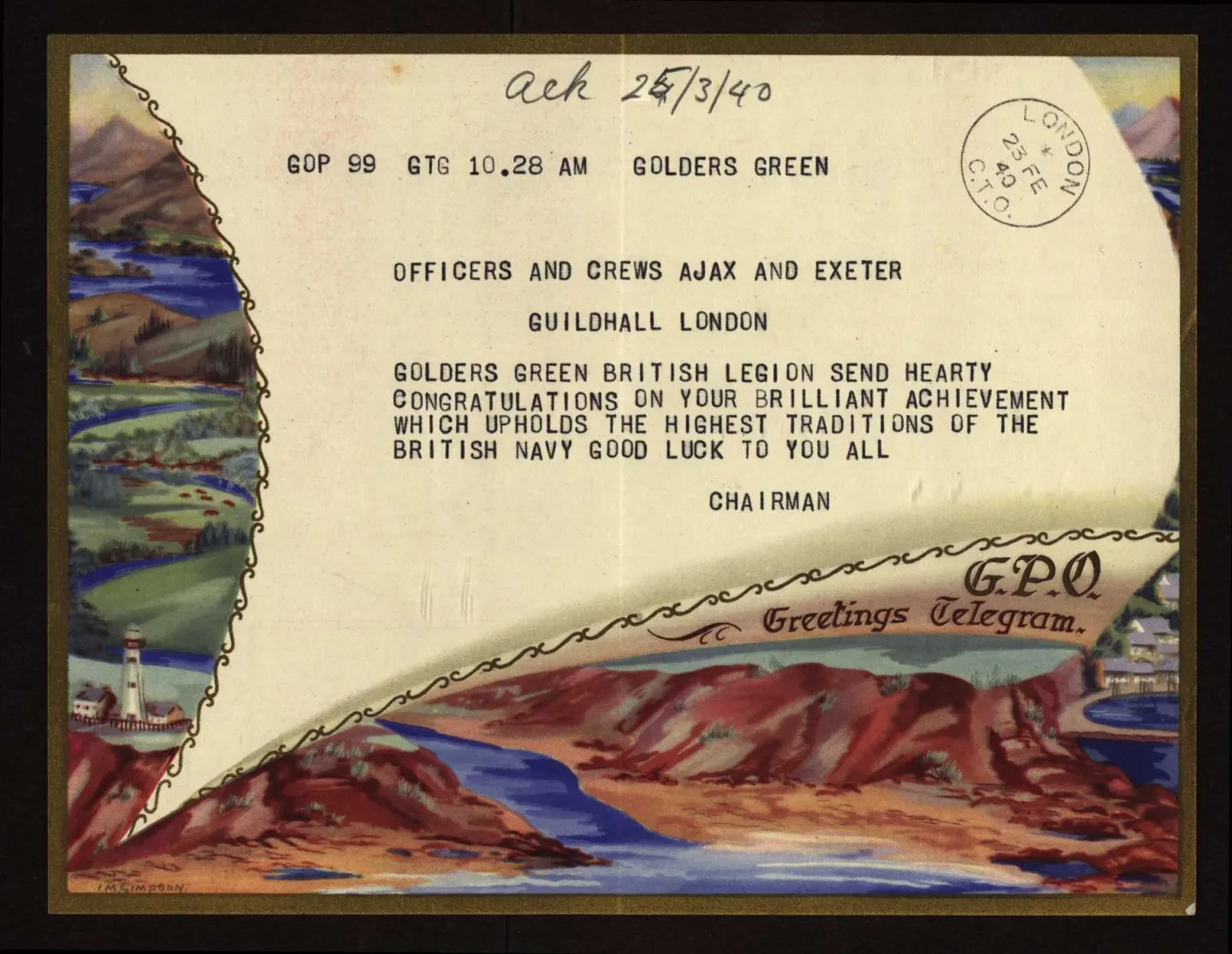
This month we take a look into Archive and Library item MSS/75/130/2 concerning Captain Frederick Secker Bell (1897-1973). Bell was educated at the Royal Naval Colleges at Dartmouth, Osborne, Isle of Wight and the Royal Navy Staff College at Greenwich. He served on board the battleship HMS Canada at the battle of Jutland in 1916, received his Captaincy in December 1938 and took command of HMS Exeter a month prior to the declaration of war on September 3 1939.
Visit the Caird Library and Archive

This item contains numerous materials ideal for the researcher or historian wishing to investigate the life of Captain Bell and his exploits during WWII. In particular England’s first major naval action of the war took place at the River Plate, which commenced on Wednesday 13 December 1939. The River Plate is an estuary between Argentina and Uruguay in the South Atlantic.
The German re-armament programme of the 1930’s included expansion of the navy, which included three cruisers, Admiral Graf Spee, Admiral Scheer and Deutschland. All became known as pocket battleships, ships with a lower tonnage than a battleship, but equipped with the same large guns as a conventional battleship. The task of such ships was as surface raiders, to intercept and sink enemy merchant shipping.
After three months at sea the Graf Spee entered the waters of South America, the British Admiralty considered surface raiders to be a significant threat and mounted a man-hunt to track down and destroy the enemy. Under the command of Commodore Henry Harwood a cruiser squadron comprising of HMS Exeter, HMS Achilles and HMS Ajax, were on patrol when lookouts on HMS Ajax saw smoke on the horizon. Harwood ordered Captain Bell on HMS Exeter to investigate, and shortly after HMS Exeter hoisted flag N – which indicates Enemy In Sight. As the Graf Spee accelerated towards HMS Exeter, the British ships divided into two parts, HMS Exeter and HMS Ajax with HMS Achilles staying in close quarter, which caused the Graf Spee to divide its firepower.
![The pursuit of the 'Graf Spee' by HMS 'Ajax' and 'Achilles' [at the Battle of the River Plate, 13 December 1939]](/sites/default/files/styles/max_width_1440/public/BHC1617%282%29.jpg.webp?itok=EPlefBOa)
The first salvo from Graf Spee fell short of HMS Exeter, however the German gunners soon found the range and pressed home the attack, one shell struck the gun turret in front of HMS Exeter’s bridge resulting in almost all the gunners being killed or wounded.
Splinters and shrapnel from the blast showered HMS Exeter’s open bridge and only three of the bridge crew survived including Captain Bell. It was not long before HMS Exeter was badly damaged and many of the guns were out of action, in addition, communications with the wheelhouse had been severed. In order to overcome the problem a chain of men were used to issue orders to the lower steering position. With HMS Exeter back on course the ship continued to fire with few guns, even at this low point Captain Bell was determined to destroy the enemy and he confided in his officers if the opportunity presented itself he would ram the Graf Spee. Commodore Harwood later ordered HMS Exeter to withdraw and head for the Falkland Islands.

Eventually, with no discernible damage or unimpaired speed, Graf Spee ceased fire and broke off the action, Commodore Harwood gave orders to pursue and the chase was on which would see the Graf Spee arrive at the port of Montevideo in Uruguay.
Montevideo was a neutral port, which confirmed Graf Spee could not stay longer than 24 hours, if a ship stayed longer it would be interned, which the British did not favour, they had to be certain the Graf Spee was either sunk or captured. The Graf Spee’s Captain, Hans Langdorff faced the possibility of more British ships waiting for him when he had to leave Montevideo, therefore the British made diplomatic manoeuvres to delay Graf Spee in Montevideo as long as possible to give time for the Royal Navy to prepare to engage the German ship again. It transpired, Captain Langsdorff had been granted 72 hours in Montevideo and had to leave by the evening of December 17, when the time came to depart, Captain Langsdorff and a skeleton crew took Graf Spee out of port with thousands of onlookers waving goodbye. After setting the demolition charges to explode, the crew abandoned the ship approximately three miles from shore and were later interned for the duration of the war. The charges exploded with tremendous force, the stern was detached and the ship was engulfed in flames. Within minutes Graf Spee began to sink, however the ship was in shallow water and only the keel sank, though it was obvious the ship was totally destroyed. Captain Langsdorff would have preferred to sink the Graf Spee in deeper water, but was not certain if there was enough ammunition for his heavy guns to be able fight an engagement to reach deep water.
The final casualty of the conflict was to be the Captain of the Graf Spee, Hans Langsdorff, who had earned the respect of friend and foe. Langsdorff believed the fate of a Captain is bound to the fate of his ship, subsequently in his hotel room at Montevideo he took his own life by pistol shot, his body was found laying on the Imperial German flag, not the flag of Nazi Germany. Due to Langsdorff’s decision to sink Graf Spee many lives were saved on both sides.
The River Plate incident was a significant boost for British moral and a victory parade was held in London in celebration, the parade was routed through Trafalgar Square to pass Nelson’s Column. The same day, King George VI held an investiture at Horse Guards Parade to present honours and awards to the Graf Spee victors.

Included in this item are numerous official documents and unofficial letters from relatives of the men who were lost in the battle. A recording was made (n.d.) by the BBC about the Battle of the River Plate, narrated by Donald Swann. (Please contact the Archives at the BBC for more information.) There is also a printed publication (Dec. 1947) as follows: “The following account of crew and destruction is based entirely captured German records, including the ships log”.
To find out more browse our online catalogues